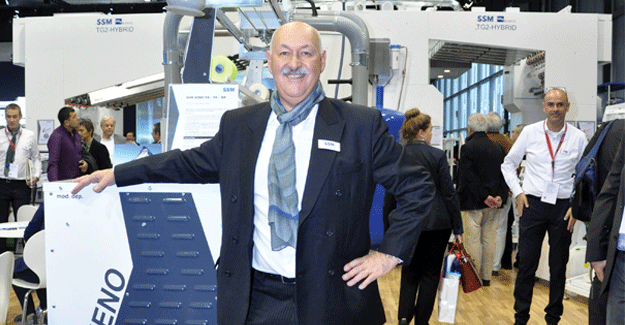At Stoll, We Believe In Building Long Term Relations
At Stoll, We Believe In Building Long Term Relations

Stoll brought the concept of 'Are you ready for Stoll?' to ITMA this year. The exhibition concept was designed to meet the special requirements of the Italian fashion market. Visitors at the Stoll booth were allowed to feel the knitting pieces and enjoy the world of pattern. The 'ready to feel' range was completely inspiring and the vast spaces of the booth left enough place of discussion too. We got a chance to interact and understand why we should be ready for Stoll, from Thomas Hoffmann, Area Sales Manager and Andreas Schellhammer, CEO. In conversation with the rockstars of Stoll.
How has ITMA been for Stoll this year?
Thomas Hoffmann: ITMA has been very fruitful. We enjoyed the quality of attention we got from the visitors this year at Milan. We were counting visitors from every quarter of the world and we can only say that our happiness increased with the visitor count going up.
How do you account for the Indian and Bangladeshi visitors for this ITMA?
Andreas Schellhammer: We had an impressive count of Bangladeshi visitors. But the Indian visitors simply stole the limelight. Basically if we have to account for the visitors from these two sectors, we will definitely have to speak for the quality of such visitors. Healthy conversations and serious business talk was the centre stage of their visit to the Stoll booth. It was not only about curious visitors, but about serious visitors.
How was business at ITMA?
Andreas Schellhammer: We have converted some general conversations to successful deals. And mostly from Bangladesh. But we never come to ITMA with the business intent. It is post the show that the serious conversations are progressed to successful business.
Thomas Hoffmann: We don't crack deals, we only build long term relations. Meeting one new customer at ITMA is a bigger achievement as compared to signing 100 deals.
How was the response from the global quarters?
Thomas Hoffmann: Europe was a charmer for sure. We have done considerably good business with Turkey, signed a few deals too. We had definitely expected a prominence from Turkey, owing to the settling down of the political unrest. But our projections have been surpassed owing to the unbeaten response.
The Bangladesh market is facing a lot of energy issues at the moment. Do you think growth will still not be a hindrance for this country?
Thomas Hoffmann: Business will not walk away from Bangladesh, whatever happens. And the knitting industry will see the maximum growth. Energy is definitely a persistent problem and is directly linked to logistics and organisation. There is plenty of gas in the Bay of Bengal, the gas needs to be channelised in the right way so that the industry can benefit from the same in a wholesome way. Also on another aspect the industry in Bangladesh has grown a little too fast for the officials to have an account of the same. So even though the growth will not come to a stop it will slowdown for a negligible time, there will still be an unresolved energy problem. Also the labour costs here are lower.
How is Stoll contributing to the cause of sustainability?
Thomas Hoffmann: Sustainability has very less relevance when we see it in the parlance of Bangladesh. Even though there are many green factories today in Bangladesh, but the knitting industry is still quite far from the reality of sustainability. On our part as a global attempt, we try to increase the efficiency of our machines and make it highly cost effective for our customers by reducing the energy consumption of the machines. We have a reputation of bringing the energy consumption levels to bare minimum. A level from where you can't further reduce the energy usage.
Andreas Schellhammer: In our own production set up back in Germany, we are always reducing the energy usage to a bare minimum and comparably putting a check on the wastage too. We are working continuously to bring down the wastage to zero. New innovation, smarter machines is like a challenge to us and while improving upon the sustainability quotient we also look towards keeping the material consumption under check. We look at introducing minute changes along the entire production chain and believe sustenance along the line is a better thing to do.



 textileexcellence
textileexcellence 







